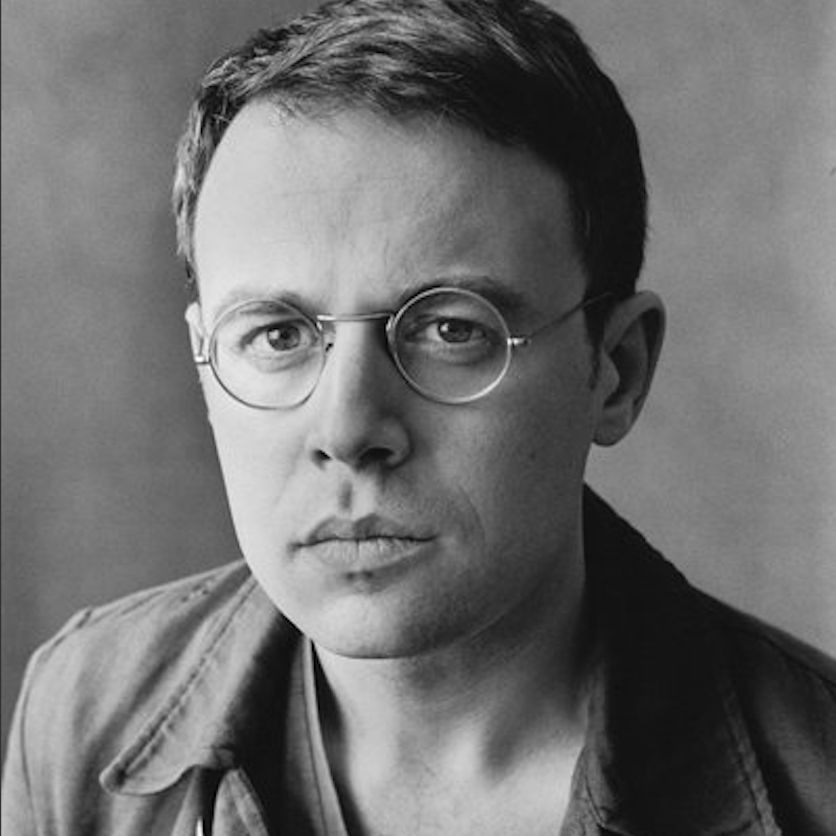Eddie S. Glaude Jr. Photo: Sameer A. Khan At LitHub, Eddie S. Glaude Jr. writes about James Baldwin’s Nothing Personal, in an afterword to a new stand-alone edition of the 1964 Baldwin essay: “The reader gets a sense of the depth of his despair and his desperate hold on to the power of love in what is, by any measure, a loveless world—especially in a country so obsessed with money.” For more Glaude on Baldwin, read this interview with the author in the Fall 2020 issue of Bookforum. In an open letter sent to The Bookseller, a group of
Joshua Cohen. Photo: Penguin Random House In The Nation’s Spring Books issue, Elias Rodriques reviews Richard Wright’s posthumously published novel, The Man Who Lived Underground. Rodriques also considers the true story of Herbert C. Wright, a man who retreated underground during the Great Depression because he was out of work: “He stole to support himself in an economy and a country that would not support him. The surrealist, fantastical, and gothic elements of both his story and The Man Who Lived Underground serve to underscore how bizarre and unnatural such a governmental structure should seem.” The Guardian has published
Alison Bechdel. Photo: Elena Seibert. The Guardian covers a new UN report that describes the widespread abuse of female journalists online. “The Chilling: Global Trends in Online Violence Against Women Journalists” was a survey of more than nine-hundred reporters in 125 countries. Unesco, the UN agency that commissioned the study, points out that this abuse has systemic implications: “Online violence against women journalists is designed to belittle, humiliate, and shame; induce fear, silence, and retreat; discredit them professionally, undermining accountability, journalism and trust in facts.” The Baffler has excerpted John Keene’s new introduction to Echo Tree, a new collection
Arundhati Roy. Photo: Wikimedia Commons The God of Small Things author Arundhati Roy has written a powerful long essay about India’s “Covid catastrophe” and Prime Minister Narendra Modi’s attempts to stifle critics of the government. Writing at The Guardian, Roy offers a dire report on what is happening in India now: “”Crematoriums in Delhi have run out of firewood. The forest department has had to give special permission for the felling of city trees. Desperate people are using whatever kindling they can find. Parks and car parks are being turned into cremation grounds.” The essay builds to a sharp
Mensah Demary Soft Skull Press’s editor in chief, Mensah Demary, talks to Catapult about his work at the indie press. Of his plans for the future, he says: “To evolve it into a house of diverse literary artists where each writer feels Soft Skull supports and respects their work. I intend to encourage readers to visit Soft Skull’s backlist and spend some time with it.” The interview is part of Catapult’s Don’t Write Alone vertical, which features resources, advice, and writing opportunities. For Commonweal magazine, Anthony Domestico reviews new poetry collections by Michael Robbins (Walkman) and Hannah Sullivan (Three
Nella Larsen The Paris Review has posted a conversation between Eloghosa Osunde, the winner of the magazine’s 2021 Plimpton Prize, and Akwaeke Emezi, author of, most recently, The Death of Vivek Oji. ProPublica is hiring three journalists for its Abrams Reporting Fellowship. The position is a two-year investigative gig, and pays $75,000 a year, plus benefits. In a call for applicants, ProPublica writes, “Our newsroom zigs where others zag.” The Marshall Project has a roundup of writing by incarcerated people about how they survived the COVID-19 pandemic in prison. Bruce Bryant writes from Sing Sing prison in New York,
Helen Oyeyemi. Photo: Tereza Linhartova Claire Grossman, Stephanie Young, and Juliana Spahr take a digital humanities approach to investigate “Who Gets to be a Writer?” for Public Books. Their analysis—which uses demographic data of the judges and winners of fifty-one literary prizes from 1918 to the present—shows that the most statistically significant factor is where a writer attended college or university. After the year 2000, they observe an uptick in the number of nonwhite, prizewinning authors, but note that literary culture “is also becoming more exclusionary, more tied to elite educational institutions, and more difficult to enter. These obstacles
Danielle Evans. Photo: Beowulf Sheehan. Danielle Evans, author of The Office of Historical Corrections and Before You Suffocate Your Own Fool Self, has won the New Literary Project’s Joyce Carol Oates Prize. Oates said of the author: “She has a wickedly sharp eye and ear for hypocrisy and is very funny about pretentiousness in private life as in public life.” The New York Times has announced that it is retiring the term “Op-Ed,” introducing new design elements meant to help differentiate between opinion journalism and news, and has hired sixteen contributing writers to the Opinion section. Opinion editor Kathleen
Jonny Sun. Photo: Rozette Rago Stacey Abrams discusses her new novel, While Justice Sleeps, and why it took a decade to find a publisher. The book, a thriller about a Supreme Court Justice who learns of a conspiracy involving the President before falling into a coma, will be published by Doubleday on May 11. At Medium, novelist Michael Chabon apologizes for being a Scott Rudin apologist. He writes that he knew that Rudin, with whom he collaborated for more than twenty years, could be abusive. “But I didn’t just know; I took it for granted, from the first. Scott
Maria Stepanova. Photo: Andrey Natotsinsky/New Directions At the New York Review of Books, Leslie Jamison writes about Divorcing, the 1969 novel by Susan Taubes, as well as the divorces in Taubes’s life and her own: “I wanted to understand my own divorce plot as one pointed toward rebirth. Perhaps my refusal to let the shadow of Taubes’s suicide color the entire book—to resist conflating novel with confession, or character with author—was a dressed-up version of an equally subjective impulse: the sharp tug of my own desire to find creative vitality and daily possibility on the other side of divorce.”
Kate Aronoff At Vanity Fair, Camonghne Felix profiles Barry Jenkins, director of Moonlight and now a miniseries based on Colson Whitehead’s novel The Underground Railroad. To describe his philosophy for adapting the surreal world of the novel for the screen, Jenkins tells Felix about a penny jar his grandmother used to keep under her bed: “These things are very tactile objects that gain sublimated, surrealistic, spiritual qualities just through this sense of belief, through something within the person that is giving the item its power. And so, no one’s going to levitate in this show. But there’s a way
Rags, Issue 5, October, 1970. For The Guardian, Ellie Violet Bramley writes about judging books by their covers. The pandemic has intensified the recent shift towards books being promoted on social media and their covers being treated, as The Bookseller creative editor Danny Arter puts it “almost like an accessory.” Vanessa Friedman looks at back issues of the short-lived Bay Area magazine Rags, which was the first publication to pinpoint, in 1970, the arrival of street style as “a discrete fashion sector.” Waverly Press has recently reissued the complete run of Rags in a box set comprising thirteen issues.
Rivka Galchen. Photo: Nina Subin. For the London Review of Books, Rivka Galchen examines three books about the brain. At Study Hall, Eliza Wallace writes a scene report on the arts and media cliques in New York City’s Dimes Square (via Los Angeles): “The scene now and much of its attending media are awash in cleverness, ego, insecurity, and the pained aggression of the rich, intellectual, and unhappy.” At Poets Writers, a Q and A with New York Times critic Jennifer Szalai. The writer, who got her start at Harper’s Magazine in 2001, has published widely and has taught
Hanya Yanagihara. Photo: Wirasathya Darmaja “It’s not unusual to be embarrassed by your first book,” writes Lamorna Ash at the Times Literary Supplement. “In Keats’s preface to Endymion (1818), published when he was only twenty-two, he suggested it was ‘not without a feeling of regret that I make it public.’ . . . Zadie Smith felt White Teeth (2000) ‘was about a hundred pages too long and suffered from a calamitous ending,’ while Peter Benchley’s assessment of Jaws (1974), which he had started writing at twenty-seven and which would go on to make him millions, was that its primary
Lucille Clifton. Photo: Rachel Eliza Griffiths/Copper Canyon Press South Side Weekly has extensive local coverage of the police shooting of thirteen-year-old Adam Toledo, including two op-eds, “Blaming the Victim” and “We are Adam Toledo”; and a timeline of the Chicago Police Department’s killing of children. The paper also has an article about who gets to define a mass shooting. At the London Review of Books, Andrea Brady writes about How to Carry Water, a new selection of poems by Lucille Clifton. The first poem in the book is an elegy for Harlem Renaissance poet Langston Hughes. “Clifton is often
Joshua Bennett. Photo: Rog Walker. The 2021 Whiting Award winners have been announced. The honorees will each receive a $50,000 prize to support their work in fiction, nonfiction, poetry, and drama, and this year include Tope Folarin, Joshua Bennett, Xandria Phillips, Marwa Helal, among others. For the fifteenth anniversary of the New York Times Book Review podcast, editor Pamela Paul selects fifteen of her favorite episodes. Melissa Gira Grant, a staff writer at the New Republic, and the author of Playing the Whore: The Work of Sex Work, has sold a new book. A Woman Is Against the Law
Merve Emre At the Chronicle of Higher Education, Jonathan Russell Clark profiles academic, author, and critic Merve Emre. They discuss writing across modes, community, and Emre’s stance that good criticism should be pedagogic. For her, the appeal of writing criticism for general audiences lies in its flexibility: “you can think historically, you can use close reading, you can use personal anecdote, you can be artful, you can tell a story while also making an argument. And none of those things needs to detract from one another—they can all be totally syncretic, and add up to something that, yes, might
N. Scott Momaday. Photo: Darren Vigil Gray The Paris Review Board of Directors has announced that N. Scott Momaday will receive their 2021 Hadada Award, and that Eloghosa Osunde has won the 2021 Plimpton Prize for her story “Good Boy.” More than 650 tech workers at the New York Times have formed a union. The group will be represented by NewsGuild of New York. As Katie Robinson, the media reporter for the Times, notes, the Times tech-workers union follows recent unionization efforts at Google, the New Yorker, Vox media, BuzzFeed News, Slate, and Vice. For T: The New York
Benjamin Moser. Photo: Wikicommons The Our Struggle podcast has released its two-hour interview with translator and biographer Benjamin Moser (Sontag): “We spent 2 hours talking to Pulitzer Prize Winner gentleman philologist Benjamin ‘Ben’ Moser about translation, being hot, the Canon, writing, Adidas and much much more.” The New York Times’s Ben Smith weighs in on “why we’re freaking out about Substack.” “Substack has captivated an anxious industry because it embodies larger forces and contradictions,” he writes. “For one, the new media economy promises both to make some writers rich and to turn others into the content-creation equivalent of Uber
Don Mee Choi. Photo: Jay Weaver The new class of Guggenheim Fellows has been announced: Don Mee Choi and Craig Morgan Teicher received fellowships in poetry; Kaitlin Greenidge and Laura van den Berg in fiction; Robyn Creswell in literary criticism; Alexander Chee and Kate Zambreno in general nonfiction. The full list is here. The PEN America Literary Awards were announced in a virtual ceremony last night. Among the winners: Ross Gay for Be Holding, Kawai Strong Washburn for Sharks in the Time of Saviors, Barbara Ehrenreich for Had I Known, and Saidiya Hartman for Wayward Lives, Beautiful Experiments. The



















